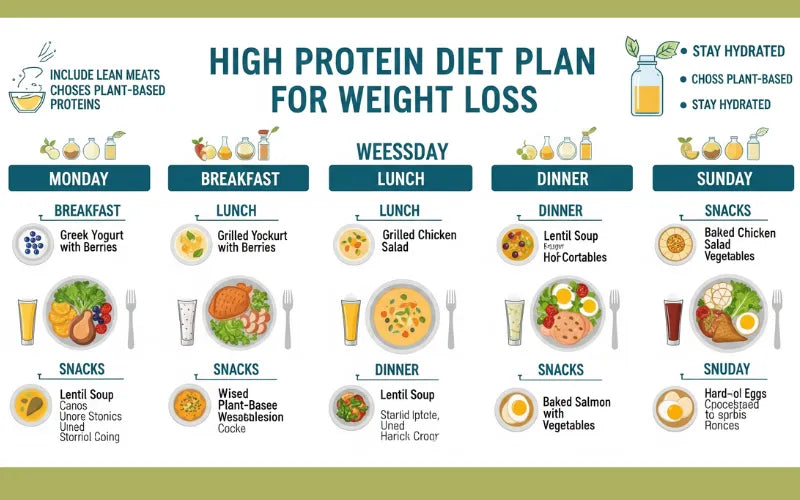
High Protein Diet Plan for Weight Loss & Muscle Gain
A high-protein diet has become increasingly popular over the past few years, and for a good reason. With its potential benefits for weight loss, muscle gain, and overall health, it's no surprise that individuals are seeking to incorporate more protein into their regular diet.
Improve your nutrient absorption and cellular health on a high-protein diet with Vital Earth Minerals' Cellular Detox.
What is a High-Protein Diet?
A high-protein diet involves consuming protein-rich foods, including lean meats, eggs, fish, dairy products, beans, and legumes. The primary goal of this diet is to increase the body's protein intake, which is crucial for building muscle, repairing tissues, and supporting various bodily functions. Protein helps you feel full, which can control your appetite and lower the number of calories you eat.
In short, a high-protein diet helps promote muscle growth, fat loss, and overall health by providing the body with the building blocks to function at its optimal level.
How Much Protein Should You Eat Each Day?
The amount of protein you require is determined by your age, sex, level of activity, and health objectives. A general guideline, though, is:
- For the average person, aim for approximately 0.8 grams of protein per kilogram of body weight.
- For active individuals or those looking to build muscle: Aim for 1.2 to 2.0 grams of protein per kilogram of body weight.
- For weight loss, it's often recommended to increase protein intake to approximately 1.6 grams per kilogram of body weight to maximize fat loss and preserve muscle.
What are the Benefits of a High-Protein Diet?
A high-protein diet has various benefits for your health that can contribute positively to your overall health. Some of the main advantages include:
1. Muscle Growth and Repair
Protein is a crucial macronutrient that helps build and maintain muscle mass. When you are strength training or exercising regularly, more protein is needed to repair and support muscle fibers, as well as aid in muscle growth.
2. Increases Metabolism and Fat Burning
Eating protein boosts the thermic effect of food (TEF), which means you burn calories while consuming it. This increase in metabolism can help those who want to lose weight or maintain a healthy weight.
3. Enhances Bone Strength
Research indicates that protein is a vital component in maintaining strong and healthy bones. Protein aids in the absorption of calcium and bone tissue formation, both of which are extremely important as you grow older.
4. Maintains Blood Sugar Level
Protein helps balance blood sugar levels by slowing the absorption of sugar into the bloodstream. It helps prevent increased blood sugar levels, making it a great food choice for individuals with diabetes or pre-diabetes.
5. Reduces Hunger
As stated above, protein keeps you fuller for a longer period. This is a wonderful advantage when it comes to weight control, as it will lower the risk of overeating or having a snack between meals.
One-Week High-Protein Diet Plan
Here is a one-week high-protein meal plan that uses a variety of high-protein foods, mixed with healthy fats and carbohydrates. This meal plan will help you meet your protein intake while providing all the necessary nutrients to support a healthy lifestyle.
Day 1: Lean Protein Kick-Start
On Day 1, we emphasize lean protein sources, including eggs, chicken breast, and salmon. This diet plan is designed to kick-start your high-protein journey, providing a balanced mix of healthy fats, fiber, and complex carbohydrates to sustain your energy levels throughout the day.
|
Meal |
Menu |
Protein (Approx.) |
|
Breakfast |
Scrambled eggs with spinach and feta cheese, whole-grain toast |
25g |
|
Lunch |
Grilled chicken breast salad with mixed greens, avocado, and olive oil dressing |
35g |
|
Snack |
Greek yogurt with a handful of almonds |
15g |
|
Dinner |
Baked salmon with quinoa and steamed broccoli |
45g |
|
Total |
120g |
Day 2: Protein-Packed for Energy
Day 2 increases protein consumption by incorporating turkey, tuna, and lean beef. These foods will provide muscles with the necessary fuel while facilitating fat loss. The addition of avocado and olive oil, which contain healthy fats, further supports satiety and maintains consistent energy levels throughout the day.
|
Meal |
Menu |
Protein (Approx.) |
|
Breakfast |
Protein smoothie (whey protein, almond milk, banana, chia seeds) |
30g |
|
Lunch |
Turkey and avocado wrap with whole-wheat tortilla and veggies |
35g |
|
Snack |
Cottage cheese with sliced cucumber and cherry tomatoes |
15g |
|
Dinner |
Lean beef stir-fry with bell peppers, onions, and brown rice |
50g |
|
Total |
130g |
Day 3: Muscle Recovery and Growth
Day 3 highlights a combination of lean meats, such as chicken and tuna, with a high concentration of vegetables to ensure the body receives the necessary vitamins and minerals. It also features a protein-based snack in the form of pumpkin seeds and protein bars to support muscle repair and growth.
|
Meal |
Menu |
Protein (Approx.) |
|
Breakfast |
Omelette with eggs, mushrooms, and lean ham |
30g |
|
Lunch |
Tuna salad with mixed greens, olives, and a boiled egg |
30g |
|
Snack |
A handful of pumpkin seeds and a protein bar |
20g |
|
Dinner |
Grilled chicken thighs with sweet potato and asparagus |
45g |
|
Total |
125g |
Day 4: Light and Protein-Rich
Day 4 has light meals with a protein kick. Baked cod and grilled shrimp are excellent protein sources, complemented by the addition of vegetables like quinoa and green beans, which provide fiber and vitamins to help balance the intake. This is a great day for seafood lovers.
|
Meal |
Menu |
Protein (Approx.) |
|
Breakfast |
Greek yogurt parfait with granola and blueberries |
25g |
|
Lunch |
Grilled shrimp tacos with salsa and avocado |
35g |
|
Snack |
Hard-boiled eggs with a small apple |
12g |
|
Dinner |
Baked cod with wild rice and steamed green beans |
43g |
|
Total |
115g |
Day 5: Power-Packed Protein
Day 5 emphasizes adding protein from foods such as turkey, beef, and dairy. The lean protein comes from the turkey burger, while the beef kebabs offer a rich source of muscle-building nutrition. Healthy snacks, such as hummus with carrots, throughout the day also help keep you full.
|
Meal |
Menu |
Protein (Approx.) |
|
Breakfast |
Chia pudding with protein powder, almond milk, and mixed berries |
25g |
|
Lunch |
Grilled turkey burger with a side of mixed salad |
40g |
|
Snack |
Hummus with carrot sticks |
10g |
|
Dinner |
Beef and vegetable kebabs with couscous |
45g |
|
Total |
140g |
Day 6: Vegetarian and Lean Proteins
Day 6 introduces plant-based proteins, such as tofu, to the mix without diverting from the lean meats of chicken and pork. This day includes protein shakes and high-protein snacks to ensure you're getting enough to fuel your workouts and support muscle recovery.
|
Meal |
Menu |
Protein (Approx.) |
|
Breakfast |
Scrambled tofu with vegetables and whole-wheat toast |
20g |
|
Lunch |
Chicken Caesar salad with a homemade dressing (Greek yogurt-based) |
35g |
|
Snack |
Protein shake with peanut butter and banana |
30g |
|
Dinner |
Grilled pork chops with roasted Brussels sprouts and quinoa |
40g |
|
Total |
125g |
Day 7: A Balanced Finish to the Week
On Day 7, you’ll get a balanced protein from animal and plant sources, including protein powder, chicken, and trout. A smoothie bowl in the morning provides a boost of energy, while dinner features a satisfying baked fish meal paired with roasted vegetables.
|
Meal |
Menu |
Protein (Approx.) |
|
Breakfast |
Smoothie bowl with protein powder, spinach, almond butter, and flaxseeds |
25g |
|
Lunch |
Grilled chicken wrap with avocado, tomato, and spinach |
35g |
|
Snack |
Cottage cheese with berries |
15g |
|
Dinner |
Baked trout with roasted vegetables and quinoa |
45g |
|
Total |
130g |
Conclusion
A high-protein diet can be an effective way to support weight loss, muscle gain, and overall health. Through higher protein consumption, you can achieve better satiety, enhanced fat-burning potential, and improved muscle retention. The seven-day high-protein meal plan provided above offers a well-rounded approach to help you meet your daily protein goal without compromising the taste and nutritional value of your meals. From losing a few pounds to gaining muscle, this diet plan can help you achieve your goals.
Frequently Asked Questions
Can I lose weight on a high-protein diet?
Yes, a high-protein diet can also aid in weight loss by making you feel fuller, increasing your metabolic rate, and helping to maintain lean muscle mass.
How much protein should I consume daily to lose weight?
Target 1.6 grams of protein per kilogram of body weight to maximize fat loss with minimum loss of muscle mass.
What are some good sources of protein?
Some great sources of protein are lean meats, fish, eggs, Greek yogurt, tofu, beans, legumes, and protein powders.
Is a high-protein diet safe?
A high-protein diet is generally safe for most people, provided you're in good health and drink plenty of water. However, if you have kidney disease or other health issues, it's advisable to consult your healthcare provider before making significant changes to your diet.

